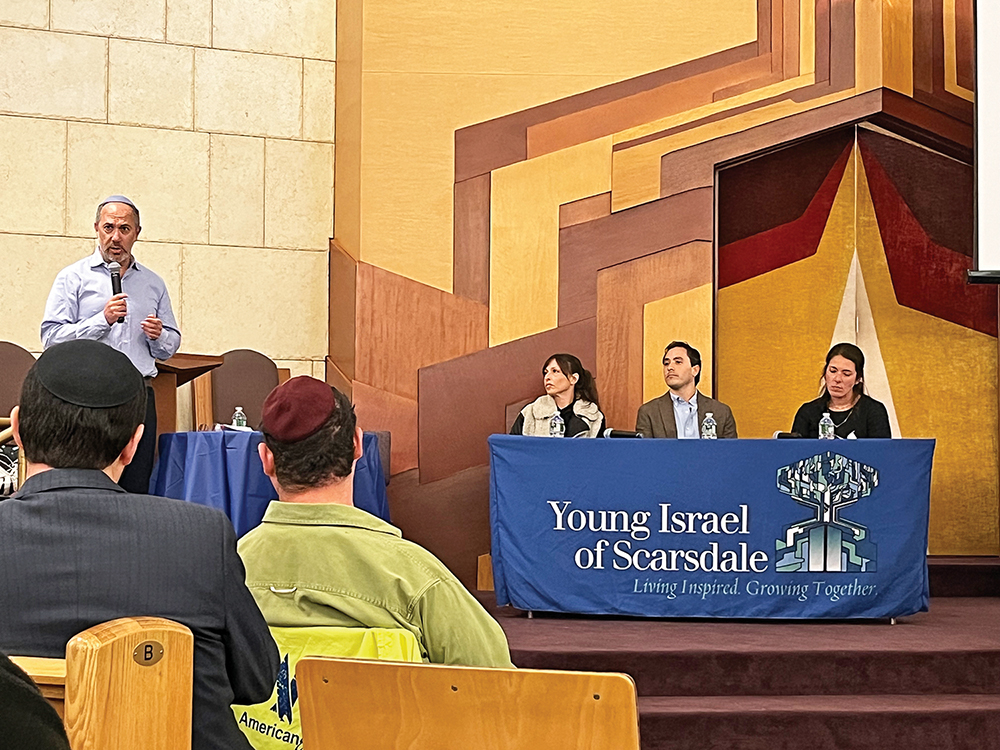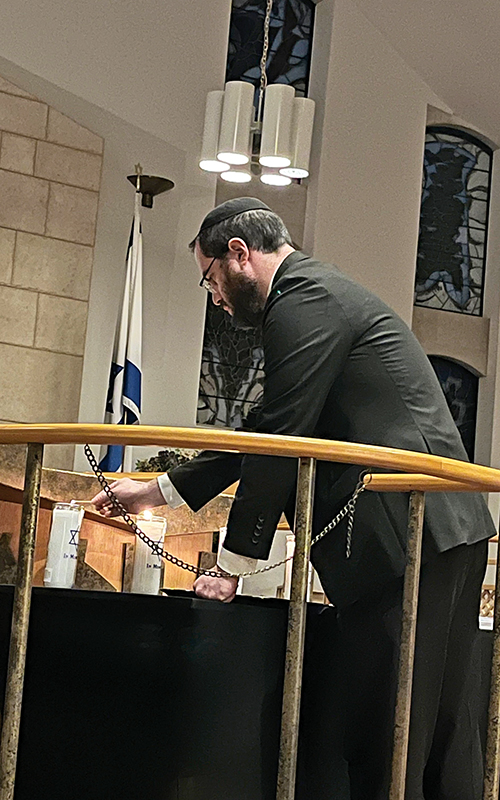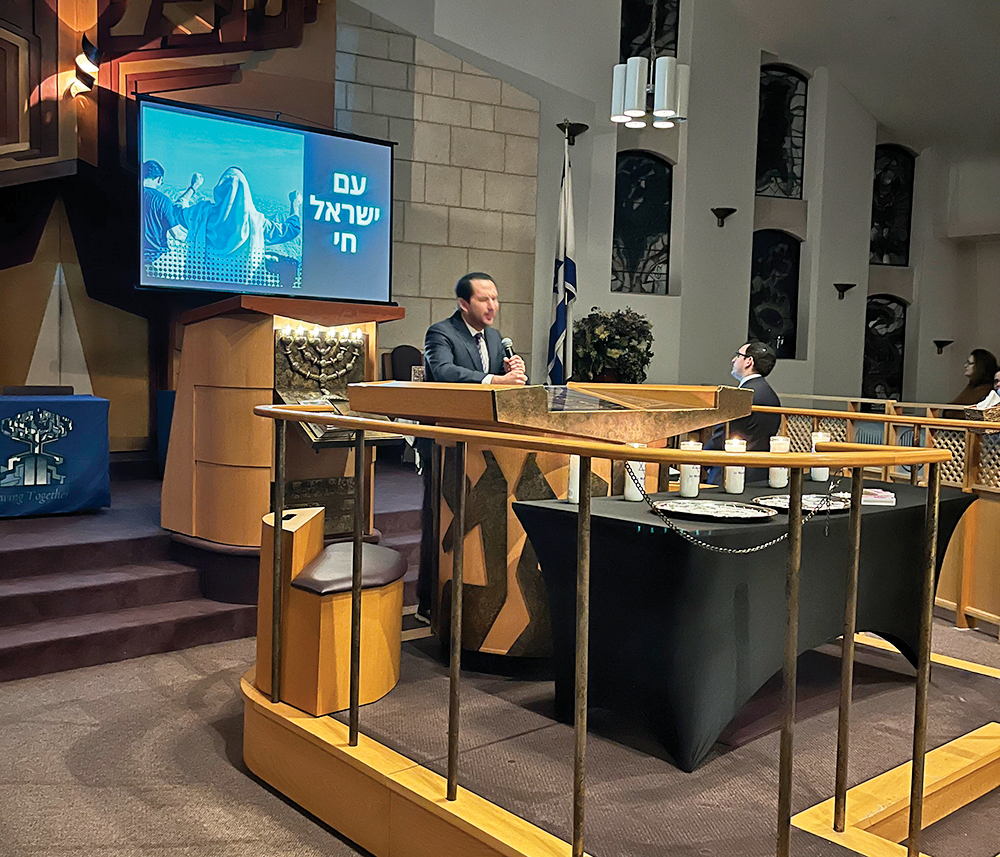
On May 5, Westchester communities commemorated Yom HaShoah at the Young Israel of Scarsdale (YIS) in New York. The program was entitled “Stories of Survival Throughout the Generations.” Six community rabbis lit memorial candles.
YIS Rabbi Morgenstern remarked, “The last time we were here together as a community was in the immediate aftermath of Oct. 7. But our strength is in our unity, as a community.” Morgenstern quoted President Herzog’s speech earlier that day at Israel’s Yom HaShoah observance. “Throughout the decades that have passed since the Holocaust, we reassured ourselves time after time never again. We swore the Jewish people would never again stand defenseless and unprotected.
“Despite all that, the horrors of the Holocaust shook us all during the October massacres, echoing in all our hearts. To me, the description of mothers silencing babies so they wouldn’t cry in a way that would give away their hiding place, of children torn from their parents and abominable murderers, who saw in the Nazis, a model to emulate. The most Jews were slaughtered in one day since the Holocaust.” Herzog noted, “Oct. 7 was not a Holocaust because today we have the state of Israel and the Israel Defense Forces, although the results of the tragedy and the shock still haunt us. Our brothers and sisters who perished in the Holocaust would only dream of a country and an army of our own in the homeland two millennia after being exiled from it.”

Herzog spoke to Holocaust survivors stating, “You are our eternal heroes. Your legacy is a legacy of resilience, of pride, of hope, the source of our unwavering belief that our people can overcome anything.”
The program continued with the screening of Maaleh Film Institute’s short film, “Girl #60427,” which won a BAFTA, Britain’s equivalent to the Academy Awards. In the film, director Shulamit Lifshitz tells her own story of learning her grandmother was a Holocaust survivor. In Tel Aviv during the summer of 1998, she finds her grandmother’s secret Holocaust notebook. Grandma’s story resonates in her well-developed imagination. The fun week in Tel Aviv with Grandpa and Grandma turned into something else entirely. Lifshitz’s grandmother’s diary is now at Yad Vashem.
The event continued with the Dor L’Dor L’Dor panel discussion led by Dr. Jeffrey Berger, son of Holocaust survivors, and three grandchildren of Holocaust survivors, Nicole Horowitz, Judah Sosnick and Malka Helft.
Horowitz told the story of her bubby from Poland, who was 12-years-old in 1939 when the Germans invaded her town. “Polish neighbors, who the day before called them their friends, shouted ‘Death to the Jew.’” Her bubby watched her father and two brothers taken to camps. She watched her mother’s sheitel ripped off as she was herded onto a train. Surviving the camps and death marches, she was liberated from Bergen-Belsen in April 1945.
Sosnick described listening to his grandfather from a recording. “It’s striking how everything happens slowly, then suddenly, all at once. Their business is taken away. There’s no jobs, no school, patches on clothing, and then, in the winter of 1942, shipped off to a ghetto.” On arrival at the ghetto, his grandmother passed away from typhus. Later, the grandfather also nearly died from typhus and typhoid. Hearing the ghetto was going to be liquidated, they ran to the forest, which was hell on earth; starvation caused him and his brother to break into a labor camp just to survive.

Sosnick added, “A couple of months after that, at the end of 1943, they [the two brothers] heard that [the Germans] were going to liquidate that labor camp.” They escaped into the forest, somehow reuniting with their father and one sister. The second sister died in the forest from appendicitis the week before they were reunited. A few weeks later, they split up to search for food. One day they heard the Germans; her grandfather’s brother and father were captured and killed while he survived by escaping barefoot in the snow. He told of constantly being hunted, praying constantly, on the move, starving, looking for a place to survive from moment to moment until the area was liberated.
Helft relayed the story about her grandmother, who lived in Czechoslovakia before the war. “Right after Pesach 1944, they [the family] put their Passover dishes away. The next morning, they were taken to Auschwitz. The family went together but were separated immediately. Her mother and father were sent to one side; she was sent with her sister and brother to another side. They were lucky enough to work until they were let out.” In 1945, after camps were liquidated, their mother survived the death march.”
The audience joined Morgenstern, singing “Acheinu” and “Ani Ma’amin,” “in the firm belief in unity and a better tomorrow.”
The event also featured the Young Israel of North Woodmere’s Oct. 7 exhibit “Reflections of Past; Promises of Renewal,” bearing witness to the destruction and loss in southern Israel.







